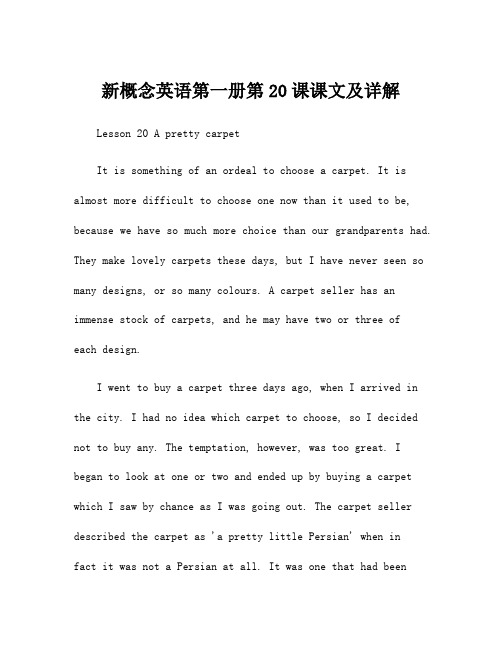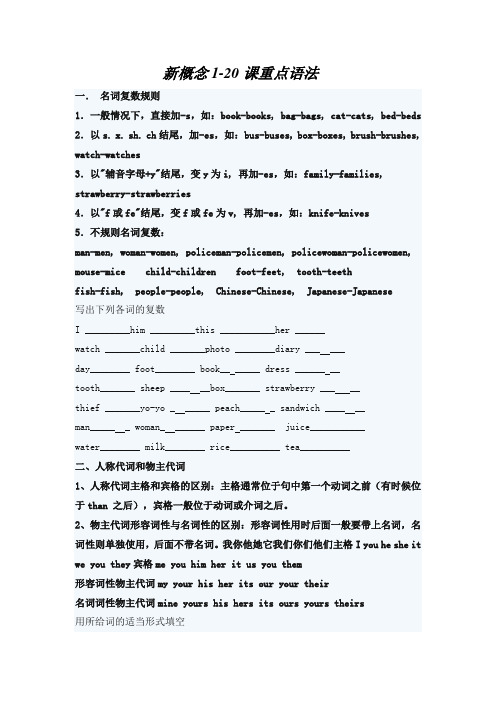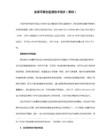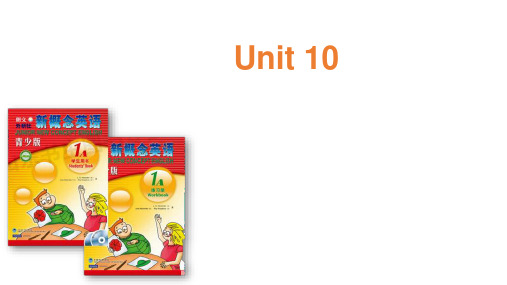新概念英语讲义第一册20
新概念英语第一册第20课课文及详解

新概念英语第一册第20课课文及详解Lesson 20 A pretty carpetIt is something of an ordeal to choose a carpet. It is almost more difficult to choose one now than it used to be, because we have so much more choice than our grandparents had. They make lovely carpets these days, but I have never seen so many designs, or so many colours. A carpet seller has an immense stock of carpets, and he may have two or three ofeach design.I went to buy a carpet three days ago, when I arrived in the city. I had no idea which carpet to choose, so I decided not to buy any. The temptation, however, was too great. I began to look at one or two and ended up by buying a carpet which I saw by chance as I was going out. The carpet seller described the carpet as 'a pretty little Persian' when infact it was not a Persian at all. It was one that had beenmade in a factory an hour's drive away. The carpet seller would have called any carpet 'a pretty little Persian', but I was not deceived. I did not care what it was called; I was simply attracted by its design and colour. Nevertheless, the carpet seller had a habit of making everyone feel he had got something really special. On the way out, he put his hand on my shoulder and said, 'You've made a good choice, Sir!' I was still wondering whether I had, when I got it back to the hotel. As I was admiring it in my room, a friend of mine came in and admired it too. He asked me how much I had paid for it and I told him the price. 'I am the carpet seller in the city,' he said, laughing, 'but when I sell a carpet, I never tell people the price I paid for it!'【课文讲解】1. It is something of an ordeal to choose a carpet.【译文】挑选一张地毯,真是一场折磨。
新概念第一册1-20课语法重点

新概念1-20课重点语法一.名词复数规则1.一般情况下,直接加-s,如:book-books, bag-bags, cat-cats, bed-beds 2.以s. x. sh. ch结尾,加-es,如:bus-buses, box-boxes, brush-brushes, watch-watches3.以"辅音字母+y"结尾,变y为i, 再加-es,如:family-families, strawberry-strawberries4.以"f或fe"结尾,变f或fe为v, 再加-es,如:knife-knives5.不规则名词复数:man-men, woman-women, policeman-policemen, policewoman-policewomen, mouse-mice child-children foot-feet, tooth-teethfish-fish, people-people, Chinese-Chinese, Japanese-Japanese写出下列各词的复数I _________him _________this ___________her ______watch _______child _______photo ________diary ___ ___day________ foot________ book__ _____ dress ______ __tooth_______ sheep ____ __box_______ strawberry ___ __thief _______yo-yo _ _____ peach_____ _ sandwich ____ __man_____ _ woman_ ______ paper _______ juice___________water________ milk________ rice__________ tea__________二、人称代词和物主代词1、人称代词主格和宾格的区别:主格通常位于句中第一个动词之前(有时候位于than 之后),宾格一般位于动词或介词之后。
新概念英语第一册第20课lesson20课件——one man in a boat

catch sight of:看见=see
catch up with :赶上,跟上
eg. Go ahead please.I’ll soon catch up with you
★fisherman n. 钓鱼人,渔民 fish→ fisherman (pl.fishermen) [注]不要忘了er 1)fish 鱼 (pl.) 单复数同形
even 甚至 more/less lucky less+原级 (消极比较级) : A is less ... than B A比B更不...
I am less happy than before. This story is less interesting than that one.
练习题: 用括号内动词的适当形式填空:
work. 14.A lot of men have given up _w__e_ar_i_n_g__(wear) hats. 15.She is very interested in _d_a_n_c_in_g__ (dance). 16.On _e_n_te_r_i_n_g (enter) the room, he turned on the light.
I oftenห้องสมุดไป่ตู้fish for hours without catching anything.
without prep. 没有 (可放句首,句尾) prep + n./v.-ing/pron.
He went out without saying anything. =He went out and he didn’t say anything. I can not live without you. 我离开你不能活。 But this does not worry me. worry v. 使…担心 worry sb.使…担心 困扰某人
新概念英语1--20课课文详解

词汇学习 Word study 1.suit n.(一套)衣服: Is this your suit? 这是你的衣服吗? a man's suit 一套男装; a woman's suit 一套女装 2.please:interjection (表示有礼貌地请求对方)请;烦劳: My coat and my umbrella please. 请把我的大衣和 伞拿给我。 Please come in. 请进。
B 1 Is she a German student or a Japanese student? She isn't a German student. She's a Japanese student.
2 Is this a German car or a French car? It isn't a German car. It's a French car. 3 Is he an Italian student or a German student? He isn't an Italian student. He's a German student. 4 Is she an Italian student or a Chinese student? She isn't an Italian student. She is a Chinese student.
5 Is this an American car or an English car? It isn't an American car. It's an English car.
新概念一Lesson19-20(共37页)

IV. Write in the plurals of these nouns : --------hero belief thief milkman yuan pound chess ----------------------------------- plurals of these nouns : --------sheep people meter deer quiz mouse zero -------------------------------------------------
★ tired adj. 累,疲乏
eg. I’m tired. 我累了。 tire out: completely tired 精疲力竭 tireless adj. [’taɪəlɪs] 1. 不倦的;不疲倦的;不厌倦的;孜孜不倦的 2. 坚韧的;持久的 tirelessly adv. 1. 不知疲倦地2. 不屈不挠地;坚 忍地 a tireless worker/teacher/student/mother
Text [课文 课文] 课文
MOTHER: GIRL: BOY: MOTHER: Are you BOY: MOTHER: What's the matter, children? We're tired … … and thirsty, Mum. Sit down here. all right now? No, we aren't. Look! There's an ice cream man. MOTHER: Two ice cream please. Here you are, children. CHILDREN: Thanks, Mum. GIRL: These ice creams are nice. MOTHER: Are you all right now? CHILDREN: Yes, we are, thank you!
新概念第一册19-20课精品课件

look 表示“看”,单独使用,后面不加对象。
看!有两个买冰淇淋的人在商店里。(shop)
Look! there are two ice cream men in the shop. look at表示“看·····”,后面加对象。
看这个买冰淇淋的人
句型3: 选择疑问句的复数形式
用第20课的图片使用选择疑问句看图说话。
Are Simon's shoes
clean or dirty?
They are clean. Simon’s shoes/clean/dirty
选择疑问句的复数形式
Are the girl’s hands
clean or dirty?
sb.表示某人,with 是介词,所以sb.某人必须用宾格的人称代词。
你怎么了? What’s the matter with you? = What’s wrong with you? 我饿了。 I’m hungry.
1. matter n. 事情,事件
你怎么了?他怎么了?她怎么了?它怎么了?他们怎么了? What’s the matter with sb.? = What’s wrong with sb.? sb.表示某人,with 是介词,所以sb.某人必须用宾格的人称代词。
她怎么了? What’s the matter with her? = What’s wrong with her? 她渴了。 She’s thirsty.
1. matter n. 事情,事件
2) 当对方说 I’m sorry. 回答用It doesn’t matter.
2. children n. 儿童(复数)
青少版新概念1A unit10 lesson20 新授课课件

选择疑问句: 不能用Yes / No回答 选择其中之一来回答
A: Are your bags empty or full? B: Our bags are empty.
your / my bag is full / not empty
your / our bags are empty/ not full
Are your cameras old?
No, they aren’t. They’re new. ______________________________________________
2 their teachers / old? / young
Are their teachers old? _____________________________________________ No, they aren’t. They’re young. _____________________________________________ 3 their cars / clean? / dirty Are their cars clean? _____________________________________________ No, they aren’t. They’re dirty. _____________________________________________ 4 our shirts / red? / white Are their shirts red? _____________________________________________ No, they aren’t. They’re white. _____________________________________________
新概念英语第一册Lesson20

Write questions and answers.
5. their children / old? Are their children old? No, they aren’t . They’re young. 6. the shops / shut ? Are the shops shut? No, they aren’t . They’re open.
第二人称
第三人称
单数 复数
单数 复数 单数
he she
it
they
our your your
his her its their
名词性物 mine ours yours yours his hers its theirs 主代词 us you you him her it them me 宾格
Look at them! They are clean.
Look at them! They are dirty.
Look at them! They are fat.
Look at them! They are thin.
light
adj. 轻的 n. 灯
Look at them! They are light.
999
one thousand and five
1005
105 218 106 321 217 322
433 434 545
769 1001 998
Write the irregular plurals of these nouns. a man a woman a postman a milkman a child a housewife an ice cream man a policewoman – two – two – two – two – two – two – two – two men women postmen milkmen children housewives ice cream men policewomen
